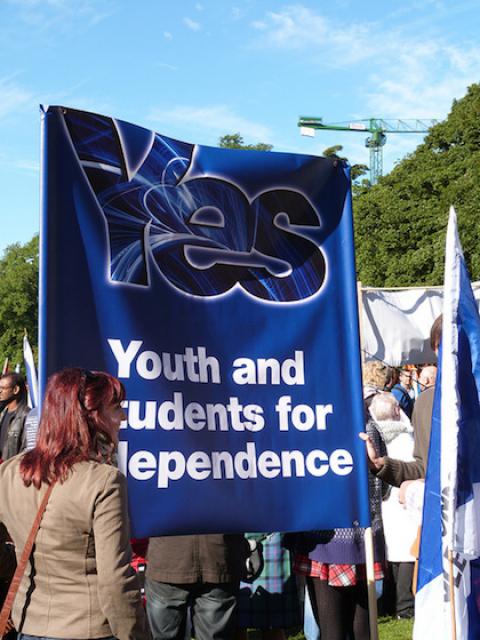Very few political issues have made me vacillate as much as the Scotland independence referendum. I started as an instinctive no, but by the end of the campaign significant strands of my thinking had moved so completely over to yes that I woke up this morning feeling both relieved and disappointed. There are, however, reasons to be universally cheerful, even for people who campaigned for and voted yes.
1. Hope is a vote-winner
Some have concluded that the result means that “fear works”. The truth is quite the opposite. Remember, this was supposed to be a cake-walk for the Better Together campaign. Instead, the government had to cobble together a contingency-plan in a panic two weeks ago. For a message of optimism to have narrowed the gap to that from 20 points a year ago is a tremendous victory. In fact, Better Together only pushed against that momentum when they themselves made positive promises for future devolution. It is a vision for the future, not fear, that ultimately worked.
2. Wider political engagement is possible
The unprecedented turnout of 85% – but also the astonishing sophistication of the debate at every level – means that the voting public are neither congenitally apathetic nor impenetrably thick, as the ruling classes would have us believe. Apathy results from the choices on offer being indistinguishable from each other and an electoral system where individual votes do not matter. It could not point the way forward more clearly. Perhaps instead of obsessing about the narrow subset of issues which concern a minority of voters who swing between left- and right-of-centre, parties might start looking at the large swathes of people who feel disengaged and have sufficient numbers to affect the result in even the safest seat. At the moment, only Ukip (UK Independence Party) is doing that.
3. Constitutional reform cometh
By forcing leaders on the Better Together side to make hasty concessions at the eleventh hour, an unstoppable chain of events has been set in motion. People are already talking of further devolution to Wales and Northern Ireland, discussing the West Lothian question, demanding devolved powers for cities and regions, a more federal model, a formal constitution, even. It is a vital discussion which is about half a century overdue.
It is tempting to look at the referendum as a throw of the dice in which one side lost. Constitutionally, the dice are still very much in the air.
4. Indelible lines drawn on the EU
The campaign has provided an illuminating rehearsal of arguments for and against EU membership. These broad principles will be difficult and embarrassing to squirm out of when the debate is transposed to the larger European “family of nations”. Having been apprehensive of an in-out EU referendum for two decades, my feelings have been transformed overnight. Bring it on. Let us have this conversation as rational adults. Let us embrace more democracy, rather than fear it. Let us trust it to make not a right or wrong decision, but a decision which best represents the democratic will of the people of the UK.
5. What sort of country do we want?
The result of the independence referendum is the beginning of a conversation, not the closing statement of a soliloquy. It became clear, relatively early on, that the conversation had mutated beyond nationalism into a profound discussion on the sort of country we want for the future. There are large swathes of mostly unheard voices which are no longer satisfied with the neoliberal view of the world put forward by leaders. Let that tremendous adrenaline now flow into the political bloodstream of the rest of the UK. Let that momentum for change join with the many millions across the other three nations who also demand an alternative to a cynical view of a future in which education and health are a privilege rather than a right; where poverty and division are the norm rather than a source of deep national shame.
That can be the yes legacy. It is significant.
[Alex Andreou was born in Greece and has a background in law and economics. He runs the Sturdy Beggars Theatre Company and blogs at Sturdyblog. Twitter: @sturdyalex]


Spread the word